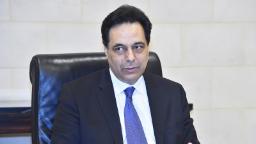[ad_1]

Paperwork forwarded to the ministries as a part of the probe made clear simply how harmful the ammonium nitrate could possibly be and warned that “setting it alight will trigger a big explosion and its end result would be the close to whole destruction of the port.”
CNN has seen a number of the paperwork enclosed in a file despatched to the Public Works Ministry.
Public Works Minister Michel Najjar reviewed the paperwork late on August 3 and instructed officers within the ministry to observe up on the matter, in keeping with the caretaker prime minister’s workplace. A stamp on the paperwork obtained by the ministry was dated August 4, 2020 — the identical day Beirut’s port was torn aside when the chemical detonated.
CNN has sought remark from Najjar and has not obtained a response.
No less than 204 folks have been killed, and hundreds extra injured within the explosion that ripped by way of the Lebanese capital. The blast, which left an orange mushroom cloud towering over the town, triggered intensive injury to Beirut’s central and japanese districts, displacing round 300,000 folks from their properties.
Greater than 4 months on, what triggered the detonation of the fabric stays unclear, however authorities officers have stated that they haven’t dominated out sabotage.
“All the pieces that is taking place is suspicious,” Diab informed CNN. “There’s one thing that is unexplainable, the timing of this, what’s taking place.”
He denies the cost and says he has been singled out regardless of the very fact the explosive materials had been saved on the port for round six years earlier than he took workplace.
“You could ask the questions: Who introduced the ship? Who owns it? Who paid for it? Who was silent about it for seven years?” Diab stated.
For the reason that ammonium nitrate arrived in Beirut, Lebanon has had 4 prime ministers, together with the nation’s present Prime Minister-designate Saad Hariri, who has denounced the charging of Diab.
Diab — who had already submitted a voluntary affidavit — declined to be questioned by the decide main the investigation, saying it lacks a constitutional foundation.
The investigation was suspended, after two of the ex-ministers going through prices requested that the decide be faraway from the case.
The paperwork forwarded to the general public works ministry earlier than the blast raised the likelihood that the explosive materials could possibly be stolen; they warn of a damaged door on the warehouse the place the lethal materials was saved, and reveal that safety there was scant.
A Lebanese intelligence official informed CNN that 1,300 tons of ammonium nitrate had gone lacking from the warehouse previous to the explosion.
Diab’s authorities, which will likely be changed when a brand new cupboard is shaped, has repeatedly acknowledged receiving prior warnings in regards to the risks posed by the storage of the explosive materials on the port.
Earlier governments have been additionally notified in regards to the warehouse, however nobody addressed the issue.
‘No regrets’
Diab has repeatedly accused Lebanon’s ruling elite of “besieging” his authorities and upending its plans to hold out a collection of financial and political reforms.
He took energy in January 2020, months after a preferred rebellion engulfed the nation, and because the crisis-ridden nation was approaching a monetary meltdown.
A technocrat and a professor on the American College of Beirut, Diab has headed a largely technocratic authorities that was ushered in by a Hezbollah-backed parliamentary majority.
However his tenure has seen the nation’s forex tank, the coronavirus pandemic take maintain, poverty ranges soar and Beirut’s port destroyed.
Diab says his authorities “was a possibility for Lebanon to retrieve a few of its losses, financial, social, monetary.”
“With the help of political events, with the help of the (Arab) Gulf (nations), with the help of the Europeans and Individuals, we’d have made an enormous, large distinction and we weren’t scary anybody,” he stated.
“In a rustic like Lebanon … you want consensus, and also you want help from the worldwide group as nicely, and the Gulf. None of those have been forthcoming.”
[ad_2]








